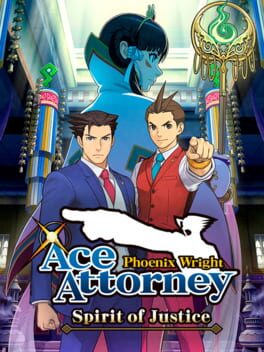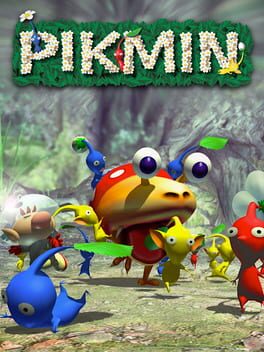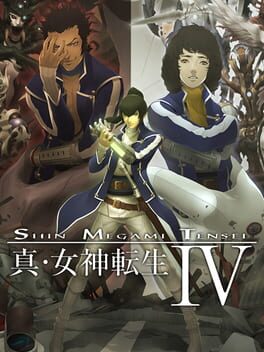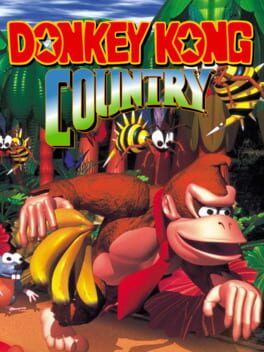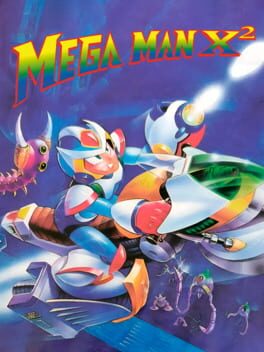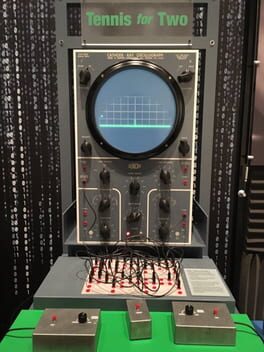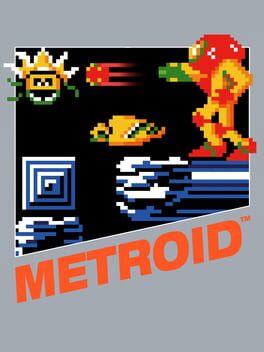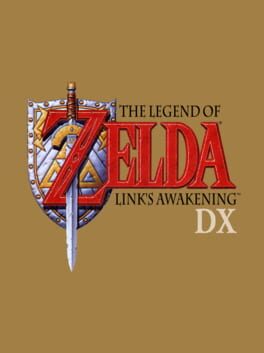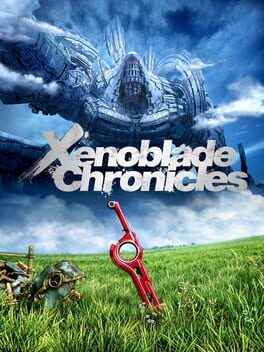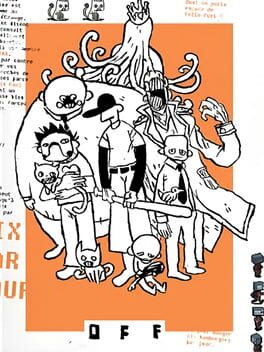1998
2001
I am begging everyone who sees Walter as a leftist/anarchist and idolizes him on that basis to please gain some bare minimum political literacy and reread literally any of his dialogue lines from Infernal Tokyo
(And to address any inevitable comments, no this isn't a dig at his writing, I think he's one of the most fascinating and compelling characters in the game; it's just that anyone who told me he's a leftist/anarchist before I played this game is a filthy liar)
(And to address any inevitable comments, no this isn't a dig at his writing, I think he's one of the most fascinating and compelling characters in the game; it's just that anyone who told me he's a leftist/anarchist before I played this game is a filthy liar)
1995
1994
1994
1958
2003
1986
Connections between the Metroid and Alien franchises:
- Similar atmosphere and worldbuilding
- Ridley's name is a reference to director Ridley Scott
- If a misogynistic Reddit dudebro is asked for an example of a female protagonist they actually like, they will nine times out of ten say Samus Aran or Ellen Ripley, depending on which medium is being talked about
- Similar atmosphere and worldbuilding
- Ridley's name is a reference to director Ridley Scott
- If a misogynistic Reddit dudebro is asked for an example of a female protagonist they actually like, they will nine times out of ten say Samus Aran or Ellen Ripley, depending on which medium is being talked about
I work in accounting and while I still do legitimately enjoy my current position, the nature of eight hour data entry shifts means that I will often return home feeling exhausted, especially on days where my seasonal allergies were particularly active. I'd often find myself unwilling to even play games after these shifts, especially since I primarily play games on PC, meaning I'd have to deal with a screen that looks just like the one that I just stared at for eight hours.
One day after work, I booted up my Switch and started playing Link's Awakening, aiming to rectify the error I made in never finishing it as a young teen experiencing it through the 3DS Virtual Console. And over the course of the five sessions I played it in (the first four of those being directly after returning home from work), I noticed that something about it seemed to make it the perfect game to play when I was tired out from an eight hour shift. This initial thought led to further thoughts about how the game was made after hours as something of a passion project by the devs. And the similarities between the circumstances Link's Awakening was made in and the circumstances I was playing it in made me realize exactly why I felt the way I did about it: it fundamentally is a game about escapism.
Whereas the adventures in the first three Zelda games are presented as something Link does both out of obligation to both the monarchy of his world and his status as a hero of legend, Link's Awakening establishes Link's primary goal as just getting back home or more specifically, waking up from a dream. However, the game puts a great deal of emphasis on him helping people on a smaller, more personal level. It initially struck me as odd how the trading sequence, a staple of the Zelda series that was introduced in this game, was mandatory here as opposed to its later incarnations where it's an optional sidequest. But it works well in presenting the game's adventure as an act of wish fulfillment on the part of Link. Instead of following some vague duties that affect the world on a macro scale that he can't really process, he's helping people in a way where he can more easily visualize the good he's done. It's one of the many examples of the first incarnation of a mechanic in a game series feeling the most impactful because it was there for a reason that isn't just "Hey it was cool when this other game did it so let's have it in this one too."
Similarly, it's interesting to contrast Marin to the earlier incarnations of Zelda when you see the former as another act of wish fulfilment on Link's part. Whereas the first three games' Zeldas don't really have chemistry with Link and only really exist to fulfill the common heteronormative fantasy of saving/getting the girl, Marin feels like an actual person. I especially love the part of the game where Marin accompanies you and all the optional interactions that happen as a result of it. Stuff like how you can have her try the Trendy Game only to get kicked out or how if you play the Ocarina, she'll tease you and pretend she didn't really goes a long way in making this part of the game feel like friends or lovers genuinely hanging out. I read Marin as representing a desire for genuine companionship on the part of Link. Maybe I'm entirely wrong with these readings but that's part of what makes stories that take place in the dreams of a major character so compelling when executed well. You can always read something interesting from any given occurrence and try to piece together what it says about the character in question.
Of course, this is all only temporary. All dreams have to end eventually and as you enter the latter half of the game, the ephemerality of the game's world becomes increasingly apparent. Ever since the defeat of the fifth boss, Link will get constantly bombarded with reminders of the true nature of Koholint Island. This culminates in the final battle which isn't against some power hungry tyrant like Ganon but rather a more abstract entity that wants to keep the world from disappearing. After this fight, the game ends with shots of all of Koholint being erased and Link waking up alone in the vast blue sea. Just as the stories we use to distract ourselves from our obligations in the capitalist hellscape we live in are only temporary, so too is the dream that keeps Link away from his obligations as a hero of legend.
But I think what stands out about the ending shot of Link alone in the ocean is how instead of crying because it's over, he smiles because it happened. While the stories we distract ourselves with may not be real, the ideas we've learned through them, the emotions we've felt through them, and possibly even the people we've met through them are. Escapism might not be a foolproof solution to our problems and could even make them worse if done in excess but it's something that humans seek out for a reason. We all need something to keep our mind off of our own struggles.
If Link to the Past was the game that set the body (i.e. structure) of the average Zelda game in stone, then Link's Awakening was the game that established the heart of Zelda, be it through the strange but memorable style of characterization that the devs gave credit to Twin Peaks for inspiring or through the various themes and ideas that Zelda explores at its best.
One day after work, I booted up my Switch and started playing Link's Awakening, aiming to rectify the error I made in never finishing it as a young teen experiencing it through the 3DS Virtual Console. And over the course of the five sessions I played it in (the first four of those being directly after returning home from work), I noticed that something about it seemed to make it the perfect game to play when I was tired out from an eight hour shift. This initial thought led to further thoughts about how the game was made after hours as something of a passion project by the devs. And the similarities between the circumstances Link's Awakening was made in and the circumstances I was playing it in made me realize exactly why I felt the way I did about it: it fundamentally is a game about escapism.
Whereas the adventures in the first three Zelda games are presented as something Link does both out of obligation to both the monarchy of his world and his status as a hero of legend, Link's Awakening establishes Link's primary goal as just getting back home or more specifically, waking up from a dream. However, the game puts a great deal of emphasis on him helping people on a smaller, more personal level. It initially struck me as odd how the trading sequence, a staple of the Zelda series that was introduced in this game, was mandatory here as opposed to its later incarnations where it's an optional sidequest. But it works well in presenting the game's adventure as an act of wish fulfillment on the part of Link. Instead of following some vague duties that affect the world on a macro scale that he can't really process, he's helping people in a way where he can more easily visualize the good he's done. It's one of the many examples of the first incarnation of a mechanic in a game series feeling the most impactful because it was there for a reason that isn't just "Hey it was cool when this other game did it so let's have it in this one too."
Similarly, it's interesting to contrast Marin to the earlier incarnations of Zelda when you see the former as another act of wish fulfilment on Link's part. Whereas the first three games' Zeldas don't really have chemistry with Link and only really exist to fulfill the common heteronormative fantasy of saving/getting the girl, Marin feels like an actual person. I especially love the part of the game where Marin accompanies you and all the optional interactions that happen as a result of it. Stuff like how you can have her try the Trendy Game only to get kicked out or how if you play the Ocarina, she'll tease you and pretend she didn't really goes a long way in making this part of the game feel like friends or lovers genuinely hanging out. I read Marin as representing a desire for genuine companionship on the part of Link. Maybe I'm entirely wrong with these readings but that's part of what makes stories that take place in the dreams of a major character so compelling when executed well. You can always read something interesting from any given occurrence and try to piece together what it says about the character in question.
Of course, this is all only temporary. All dreams have to end eventually and as you enter the latter half of the game, the ephemerality of the game's world becomes increasingly apparent. Ever since the defeat of the fifth boss, Link will get constantly bombarded with reminders of the true nature of Koholint Island. This culminates in the final battle which isn't against some power hungry tyrant like Ganon but rather a more abstract entity that wants to keep the world from disappearing. After this fight, the game ends with shots of all of Koholint being erased and Link waking up alone in the vast blue sea. Just as the stories we use to distract ourselves from our obligations in the capitalist hellscape we live in are only temporary, so too is the dream that keeps Link away from his obligations as a hero of legend.
But I think what stands out about the ending shot of Link alone in the ocean is how instead of crying because it's over, he smiles because it happened. While the stories we distract ourselves with may not be real, the ideas we've learned through them, the emotions we've felt through them, and possibly even the people we've met through them are. Escapism might not be a foolproof solution to our problems and could even make them worse if done in excess but it's something that humans seek out for a reason. We all need something to keep our mind off of our own struggles.
If Link to the Past was the game that set the body (i.e. structure) of the average Zelda game in stone, then Link's Awakening was the game that established the heart of Zelda, be it through the strange but memorable style of characterization that the devs gave credit to Twin Peaks for inspiring or through the various themes and ideas that Zelda explores at its best.
1999
2010
Mid. There is no other word for it. This is mid. It's embarassing.
Xenoblade 1 fans will claim that their cynical product is a "masterpiece" because of its character deaths yet these same fans will have the audacity to mock Justian Roiland's seminal work of art, High on Life for brilliant and original deconstruction of the video game genre by allowing players to kill a child, something that no video game has ever done before. To any Xenoblade 1 fan reading this, go back to watching MCU movies and eating McDonalds before ever daring to insult true works of art like High on Life ever again.
Xenoblade 1 fans will claim that their cynical product is a "masterpiece" because of its character deaths yet these same fans will have the audacity to mock Justian Roiland's seminal work of art, High on Life for brilliant and original deconstruction of the video game genre by allowing players to kill a child, something that no video game has ever done before. To any Xenoblade 1 fan reading this, go back to watching MCU movies and eating McDonalds before ever daring to insult true works of art like High on Life ever again.
2001
2008

